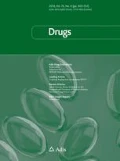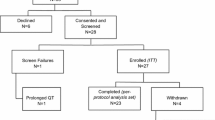Abstract
▴ Letrozole is a highly selective, nonsteroidal, third-generation aromatase inhibitor approved for first-line and extended adjuvant therapy in postmenopausal women with hormone-responsive, early-stage breast cancer. Binding of letrozole to the haeme component of the cytochrome P450 subunit of aromatase inhibits estrogen biosynthesis throughout the body.
▴ As first-line adjuvant therapy in ≈8000 postmenopausal women with hormone-responsive, early-stage breast cancer, once-daily letrozole 2.5mg significantly prolonged disease-free survival (DFS; primary endpoint) and reduced the risk of relapse at distant sites relative to once-daily tamoxifen 20mg in the ongoing Breast International Group 1–98, double-blind, multinational trial. The median duration of follow-up for this primary core analysis was 25.8 months.
▴ Extended adjuvant therapy with once-daily letrozole 2.5mg significantly prolonged DFS relative to placebo treatment at a median follow-up of 30 months (primary endpoint) in the MA-17 trial in ≈5000 postmenopausal women who were disease free after 4.5–6 years of tamoxifen therapy for hormone-responsive, early-stage breast cancer.
▴ Letrozole treatment for up to 5 years was generally well tolerated in this clinical setting. As first-line treatment, relative to tamoxifen, letrozole was associated with a significantly lower incidence of venous thromboembolitic events, vaginal bleeding, hot flushes and night sweating, whereas the incidence of cardiac failure, bone fractures and arthralgia was higher in letrozole recipients.


Similar content being viewed by others
Notes
The use of trade names is for product identification purposes only and does not imply endorsement.
References
Tobias JS. Endocrine approaches for the treatment of early and advanced breast cancer in postmenopausal women. Int J Biochem Cell Biol 2004; 36(11): 2112–9
Baum M. Current status of aromatase inhibitors in the management of breast cancer and critique of the NCIC MA-17 trial. Cancer Control 2004; 11(4): 217–21
Michaud LB. Adjuvant use of aromatase inhibitors in postmenopausal women with breast cancer. Am J Health Syst Pharm 2005; 62(3): 266–73
Buzdar AU. Data from the Arimidex, Tamoxifen, Alone or in Combination (ATAC) trial: implications for use of aromatase inhibitors in 2003. Clin Cancer Res 2004; 10 Suppl. 1: 355–361s
Smith IE. Aromatase inhibitors: extending the benefits of adjuvant therapy beyond tamoxifen. Breast 2004; 13 Suppl. 1: S3–9
Simpson D, Curran MP, Perry CM. Letrozole: a review of its use in postmenopausal women with breast cancer. Drugs 2004; 64(11): 1213–30
Lamb HM, Adkins JC. Letrozole: a review of its use in postmenopausal women with advanced beast cancer. Drugs 1998; 56(6): 1125–40
Keating GM, Jarvis B. Letrozole: an updated review of its use in postmenopausal women with advanced breast cancer. Am J Cancer 2002; 1(5): 351–71
Haynes BP, Dowsett M, Miller WR, et al. The pharmacology of letrozole. J Steroid Biochem Mol Biol 2003; 87(1): 35–45
Bajetta E, Zilembo N, Bichisao E. Aromatase inhibitors in the treatment of postmenopausal breast cancer. Drugs Aging 1999; 15(4): 271–83
Buzdar AU. Pharmacology and pharmacokinetics of the newer generation aromatase inhibitors. Clin Cancer Res 2003; 9 Suppl.: 468–472S
Geisler J, Haynes B, Anker G, et al. Influence of letrozole and anastrozole on total body aromatization and plasma estrogen levels in postmenopausal breast cancer patients evaluated in a randomized, cross-over study. J Clin Oncol 2002; 20(3): 751–7
Ellis MJ, Coop A, Singh B, et al. Letrozole inhibits tumor proliferation more effectively than tamoxifen independent of HER1/2 expression status. Cancer Res 2003; 63(19): 6523–31
Perez EA, Josse RG, Pritchard KI, et al. Effect of letrozole versus placebo on bone mineral density in women completing ≥5 years (yrs) of adjuvant tamoxifen: NCIC CTG MA.17B [abstract no. 404]. Breast Cancer Res Treat 2004; 88 Suppl. 1: S36
Wasan KM, Goss PE, Pritchard PH, et al. The influence of letrozole on serum lipid concentrations in postmenopausal women with primary breast cancer who have completed 5 years of adjuvant tamoxifen (NCIC CTG MA.17L). Ann Oncol 2005; 16(5): 707–15
Morales L, Timmerman D, Neven P, et al. Third generation aromatase inhibitors may prevent endometrial growth and reverse tamoxifen-induced uterine changes in postmenopausal breast cancer patients. Ann Oncol 2005; 16(1): 70–4
Lonning PE. Clinical pharmacokinetics of aromatase inhibitors and inactivators. Clin Pharmacokinet 2003; 42(7): 619–31
Sioufi A, Sandrenan N, Godbillon J, et al. Comparative bioavailability of letrozole under fed and fasting conditions in 12 healthy subjects after a 2.5 mg single oral administration. Biopharm Drug Dispos 1997; 18(6): 489–97
Pfister CU, Martoni A, Zamagni C, et al. Effect of age and single versus multiple dose pharmacokinetics of letrozole (Femara) in breast cancer patients. Biopharm Drug Dispos 2001; 22(5): 191–7
Novartis. Femara® (letrozole tablets) prescribing information (US) [online]. Available from URL: http://www.us.femara.com/info/page/prescribing [Accessed 2005 Feb 18]
The Breast International Group (BIG) 1–98 Collaborative Group. A comparison of letrozole and tamoxifen in postmenopausal women with early breast cancer. New Engl J Med 2006; 353(26): 2747–57
Viale G, Regan M, Dell’Orto P, et al. Central review of ER, PgR and HER-2 in BIG 1–98 evaluating letrozole vs. tamoxifen as adjuvant endocrine therapy for postmenopausal women with receptor-positive breast cancer [abstract no. 44]. 28th Annual San Antonio Breast Cancer Symposium; 2005 Dec 8–11; San Antonio, TX
Goss PE, Ingle JN, Martino S, et al. Randomized trial of letrozole following tamoxifen as extended adjuvant therapy in receptor-positive breast cancer: updated findings from NCIC CTG MA.17. J Natl Cancer Inst 2005; 97(17): 1262–71
Goss PE, Ingle JN, Martino S, et al. A randomized trial of letrozole in postmenopausal women after five years of tamoxifen therapy for early-stage breast cancer. N Engl J Med 2003; 349(19): 1793–802
Mann BS, Johnson JR, Kelly R, et al. Letrozole in the extended adjuvant treatment of postmenopausal women with history of early-stage breast cancer who have completed 5 years of adjuvant tamoxifen. Clin Cancer Res 2005; 11(16): 5671–7
Goss PE, on behalf of MA.17 Collaborative Trialists. NCIC CTG MA.17: updated analysis post-unblinding [abstract plus oral presentation]. 28th Annual San Antonio Breast Cancer Symposium; 2005 Dec 8–11; San Antonio, TX
Ingle J, Goss P, Tu D, et al. NCIC CTC MA.17: increasing benefit of letrozole with longer duration of treatment as measured by the hazard ratio of disease recurrence over time [abstract plus oral presentation]. 28th Annual San Antonio Breast Cancer Symposium; 2005 Dec 8–11; San Antonio, TX
Whelan TJ, Goss PE, Ingle JN, et al. Assessment of quality of life in MA.17: a randomized, placebo-controlled trial of letrozole after 5 years of tamoxifen in postmenopausal women. J Clin Oncol 2005; 23(28): 6931–40
Dunn C, Keam SJ. Letrozole: a pharmacoeconomic review of its use in postmenopausal women with breast cancer. Pharmacoeconomics 2006; 24. In press
Laforte M-E. Novartis’ Femara receives expanded approval from FDA [online]. Available from URL: http://www.firstwordplus.com [Accessed 2006 Jan 9]
Novartis. UK leads Europe and US in milestone post-op breast cancer treatment decision [media release] [online]. Available from URL: http://www.novartis.com [Accessed 2005 Dec 12]
Novartis. Comparison trial of letrozole to anastrozole in the adjuvant treatment of postmenopausal women with hormone receptor and node positive breast cancer [online]. Available from URL: http://clinicaltrials.gov/show/NCT00248170 [Accessed 2006 Jan 20]
Novartis Pharmaceuticals Canada Inc. Health Canada approves first and only breast cancer treatment that improves disease-free survival beyond five years of diagnosis [media release] [online]. Available from URL: http://www.novartis.ca [Accessed 2005 Apr 21]
Novartis. Femara® approved in Germany as the only hormonal therapy given after standard tamoxifen for post-menopausal woman with early breast cancer [media release] [online]. Available from URL: http://www.novartis.com [Accessed 2005 Mar 15]
Author information
Authors and Affiliations
Corresponding author
Rights and permissions
About this article
Cite this article
Scott, L.J., Keam, S.J. Letrozole. Drugs 66, 353–362 (2006). https://doi.org/10.2165/00003495-200666030-00010
Published:
Issue Date:
DOI: https://doi.org/10.2165/00003495-200666030-00010




